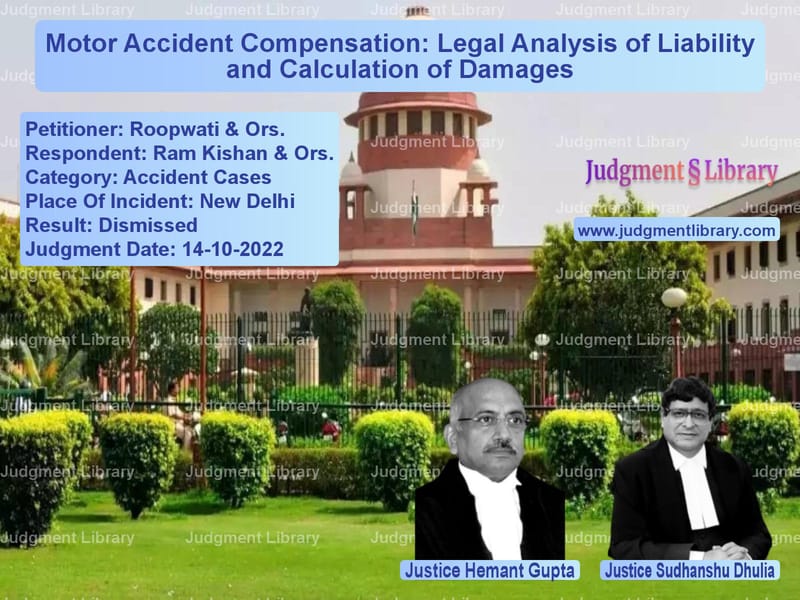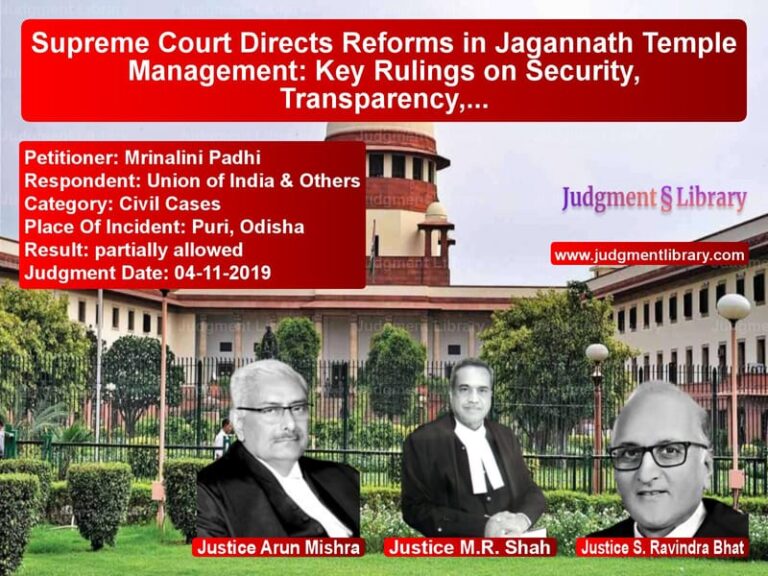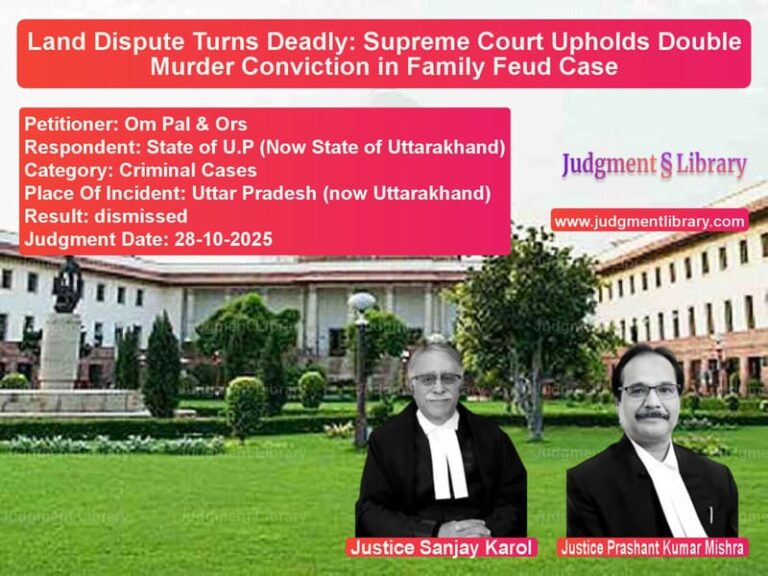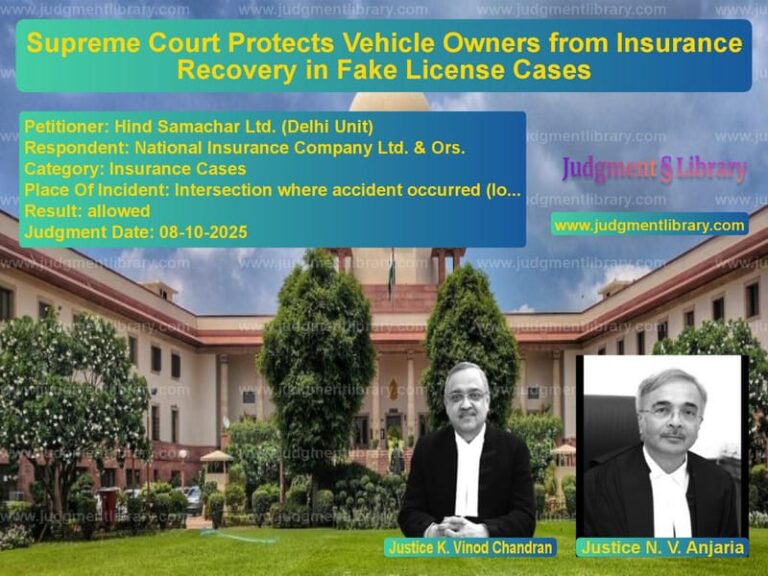Motor Accident Compensation: Legal Analysis of Liability and Calculation of Damages
This case concerns the appeal filed by the claimants, Roopwati and others, arising out of the judgment dated 26th September 2018 by the High Court of Punjab & Haryana. The appeal is against the order of the Motor Accident Claims Tribunal (Tribunal), dated 13th May 2013, in which the claimants sought compensation for the death of Hari Ram due to a motor accident. The accident occurred on 22nd November 2010 when the deceased, Hari Ram, was riding a three-wheeler with his brother Dev Prasad in the Palwal region of Haryana. The vehicle was being driven by Ram Kishan, the first respondent, and was insured with the IFFCO TOKIO General Insurance Company Ltd., the third respondent. The accident led to severe injuries to Hari Ram, and he succumbed to those injuries the following day. This case deals with the legal proceedings surrounding the claim for compensation, including issues of negligence, dependency, multiplier application, and the rate of interest for compensation.
Background:
The claim petition was filed by the wife, son, and mother of the deceased, Hari Ram, seeking compensation for his untimely death. The Tribunal, after evaluating the evidence, determined that the accident occurred due to the rash and negligent driving of the three-wheeler. The vehicle was insured, and liability was placed on the insurance company. The Tribunal awarded compensation to the claimants under various heads, including treatment expenses, monthly income of the deceased, and compensation for loss of consortium, last rites, and estate. However, the claimants were dissatisfied with the awarded compensation and filed an appeal before the High Court.
The Tribunal had applied a multiplier of 9, considering the age of the deceased as 60 years. The Tribunal had also not accounted for any future prospects in the calculation of compensation. The High Court, after hearing the parties, modified the Tribunal’s award by increasing the multiplier to 13, reflecting the correct age of the deceased (50 years, as determined by scientific evidence). Additionally, the High Court awarded increased compensation, taking future prospects into account, and enhanced the rate of interest from 7% to 7.5% per annum. This decision was challenged by the appellants in the Supreme Court, which is the subject of this appeal.
Appellant’s Arguments:
The appellant, represented by counsel, argued that the compensation awarded by the High Court was excessive and should be reconsidered. The appellant contended that the multiplier of 13 applied by the High Court was too high, as the age of the deceased had been incorrectly recorded as 50 years. The appellant’s counsel also argued that the compensation amount awarded under the heads of last rites, estate, and loss of consortium was too low. The appellant claimed that the Tribunal’s original award was fair, and the increase in compensation by the High Court was unjustified.
The appellant also raised objections regarding the calculation of future prospects, asserting that it was inappropriate to apply the future prospects principle to this case. The appellant’s counsel argued that the award under the head of future prospects should not be increased since the deceased was not working in a permanent or salaried job. Further, the appellant questioned the increase in the rate of interest from 7% to 7.5% and requested a reduction in the amount of compensation.
Respondent’s Arguments:
The respondents, represented by their counsel, defended the decision of the High Court, arguing that the compensation awarded was reasonable and just, considering the circumstances of the case. The respondents emphasized that the deceased was in his prime earning years, and the increase in the multiplier from 9 to 13 was appropriate given that the deceased was only 50 years old. The respondents contended that the High Court had correctly applied the principle of future prospects, which should be taken into account when calculating compensation for the family’s loss.
The respondents also defended the increase in the rate of interest, arguing that the High Court had taken into account the delayed nature of the proceedings and the need to provide adequate compensation to the claimants for the period of delay. The respondents pointed out that the award for loss of consortium, last rites, and estate was reasonable and within the guidelines prescribed by the relevant legal provisions.
Court’s Analysis:
The Supreme Court carefully examined the arguments raised by both parties, particularly focusing on the issue of the multiplier applied to the compensation and the calculation of future prospects. The Court observed that the correct age of the deceased was indeed 50 years, and therefore, the High Court’s decision to apply a multiplier of 13 was in line with the guidelines set forth in the case of Sarla Verma. The Court noted that the multiplier should reflect the age of the deceased and should be consistent with the principles established in earlier judgments.
The Court also addressed the issue of future prospects, acknowledging that in cases where the deceased was in his or her prime working years, future prospects could be taken into account to reflect the increase in income that might have been earned had the deceased lived. The Court held that the application of the future prospects principle was appropriate in this case, as the deceased was a 50-year-old male in active employment at the time of the accident.
The Court also considered the compensation awarded under the heads of loss of consortium, last rites, and estate. It found that the amounts awarded under these heads were in line with the guidelines prescribed in the case of Pranay Sethi. The Court noted that the loss of consortium and compensation for last rites were standard heads, and the amounts awarded by the High Court were reasonable in the context of the case.
Judgment:
The Supreme Court dismissed the appeal, upholding the High Court’s decision to enhance the compensation. The Court affirmed the application of the multiplier of 13, the inclusion of future prospects in the calculation, and the enhancement of the rate of interest from 7% to 7.5%. The Court further held that the compensation awarded under the heads of loss of consortium, last rites, and estate was just and appropriate. The Court emphasized the need to ensure that the compensation adequately reflects the loss suffered by the family and provides for their future financial needs.
Conclusion:
This case reaffirms the principles of compensation in motor accident cases and emphasizes the importance of considering the future prospects of the deceased, as well as the appropriate multiplier based on age. The decision highlights the role of the judiciary in ensuring that the family of the deceased is adequately compensated for the loss of a breadwinner, with a fair and just calculation of compensation based on the established legal framework.
Petitioner Name: Roopwati & Ors..Respondent Name: Ram Kishan & Ors..Judgment By: Justice Hemant Gupta, Justice Sudhanshu Dhulia.Place Of Incident: New Delhi.Judgment Date: 14-10-2022.
Don’t miss out on the full details! Download the complete judgment in PDF format below and gain valuable insights instantly!
Download Judgment: roopwati-&-ors.-vs-ram-kishan-&-ors.-supreme-court-of-india-judgment-dated-14-10-2022.pdf
Directly Download Judgment: Directly download this Judgment
See all petitions in Road Accident Cases
See all petitions in Compensation Disputes
See all petitions in Motor Vehicle Act
See all petitions in Judgment by Hemant Gupta
See all petitions in Judgment by Sudhanshu Dhulia
See all petitions in dismissed
See all petitions in supreme court of India judgments October 2022
See all petitions in 2022 judgments
See all posts in Accident Cases Category
See all allowed petitions in Accident Cases Category
See all Dismissed petitions in Accident Cases Category
See all partially allowed petitions in Accident Cases Category







